I’ve been following the science on climate change for years, and unfortunately, we’re seeing more and more of its real-world impacts. One of the latest concerning trends is the rise in cases of Vibrio vulnificus, often called ‘flesh-eating bacteria.’ You might have heard about this recently, especially with reports from places like Florida and Louisiana.
Did you know that Vibrio vulnificus naturally lives in warm ocean waters? That’s right. And as our oceans are getting warmer due to climate change, the environments where these bacteria thrive are expanding. This means more opportunities for Vibrio vulnificus to flourish and, sadly, to infect people.
These infections are serious. Vibrio vulnificus can cause severe illness, especially in individuals with weakened immune systems. The bacteria can enter the body through an open wound that comes into contact with contaminated water, or by eating raw or undercooked seafood harvested from these waters.
So, what can we do to protect ourselves, especially if we live near or are visiting coastal areas? Scientists and public health experts offer some straightforward advice:
- Be Cautious with Wounds: If you have an open wound, cut, or scrape, avoid wading or swimming in warm coastal waters. If you do get a wound wet, wash it thoroughly with soap and fresh water immediately.
- Handle Seafood Safely: Always cook seafood thoroughly, especially oysters and clams. This is the best way to kill any harmful bacteria. Don’t eat raw or undercooked seafood.
- Wash Your Hands: Always wash your hands with soap and water after handling raw seafood.
- Be Aware of Advisories: Pay attention to any local advisories or warnings about Vibrio bacteria in the water.
It’s a stark reminder that our planet’s changing climate has direct effects on our health and safety. By staying informed and taking these simple precautions, we can help minimize the risks associated with Vibrio vulnificus and enjoy our coastal environments more safely. I’m learning alongside you on this journey to understand these connections better, and I believe that knowledge is our best tool.

